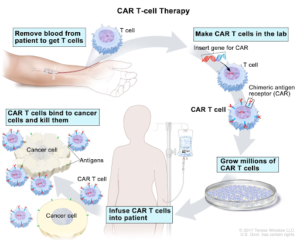In news- Global data on the efficacy of CAR T-cell therapy for cancer looks very good.
What is Chimeric antigen receptor (CAR) T-cell therapy?
- It is a way to get immune cells called T cells (a type of white blood cell) to fight cancer by changing them in the lab so they can find and destroy cancer cells.
- CAR T-cell therapy is also sometimes talked about as a type of cell-based gene therapy, because it involves altering the genes inside T cells to help them attack the cancer.
- This type of treatment can be very helpful in treating some types of cancer, even when other treatments are no longer working.
- CARs are recombinant receptors for antigens which redirect the specificity and function of T lymphocytes and/or other immune cells in a single molecule.
- The concept of using CARs in cancer immunotherapy is that CARs, which are programmed targeting tumor-associated antigens, can be replicated rapidly and homogeneously.
- Direct infusion of these armed tumor-targeting T-cells bypass the barriers and kinetics of active immunization.
- This activity describes the indications, contraindications, and complications of CART treatment and highlights the role of the interprofessional team in the management of cancer patients.

What are T-cells?
- T cell, also called T lymphocyte, a type of leukocyte (white blood cell) that is an essential part of the immune system.
- T cells are one of two primary types of lymphocytes—B cells being the second type—that determine the specificity of immune response to antigens (foreign substances) in the body.
- T cells originate in the bone marrow and mature in the thymus. In the thymus, T cells multiply and differentiate into helper, regulatory, or cytotoxic T cells or become memory T cells.
















